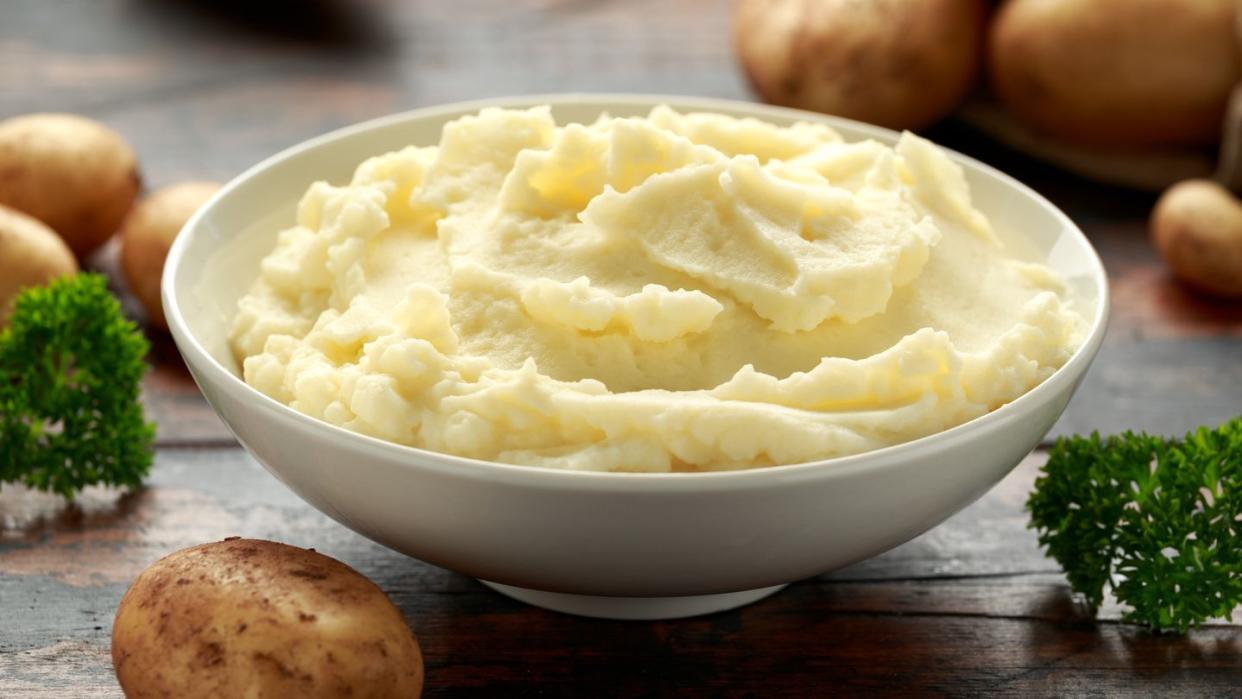Here's The Best Way To Freeze And Reheat Leftover Mashed Potatoes

So, you have leftover mashed potatoes. Maybe you just hosted a holiday dinner, or you're prepping your side dishes ahead of time to save critical stove space. Either way, you need to find a way to extend the lifespan of this creamy, buttery side.
If you're storing a potato dish for four days or less, they can go in the fridge. But what should you do if you need to save them for longer? Is alright to put them in freezer?
The short answer is yes! You can absolutely store mashed potatoes in the freezer. However, there's a particular way to do it.
How To Freeze Mashed Potatoes
First off, you need to make sure your potatoes come down to room temperature. The enemy of freezing any food is condensation. Placing hot food directly in the freezer will leave you with extra ice crystals and the dreaded freezer burn. Skipping this step is not an option.
If you have time to spare, feel free to cool your potatoes right in the pot. If you're in a rush, you can line a rimmed baking sheet with plastic wrap and spread your potatoes in an even layer. Place the baking sheet in the refrigerator for about 30 minutes, and your potatoes should be perfectly cooled.
Once your potatoes are cooled, you can transfer them into your preferred storage container. Our favorite method for batch freezing is using a resealable plastic bag. Fill the bag about 3/4 of the way with mashed potatoes and then seal it almost all the way, leaving a small opening for air to escape.
Place the bag on your countertop and carefully spread the mashed potatoes into a flat, even layer until there are no air pockets remaining. Then you can seal the bag the rest of the way. We recommend placing the bag flat on a baking sheet, then freezing until firm, about 1 hour. Once it's stiff enough, you can store the potatoes in the freezer however you'd like without worrying about taking up too much space.
If you want to store your mashed potatoes into individual portions, try using freezer cube trays. These silicone molds allow you to divide your mashed potatoes into one-cup servings. Simply fill each section with mashed potatoes, cover them with the accompanying lid, and throw them in the freezer until solid. You can remove the frozen mashed potato cubes from the mold and place them into a resealable plastic bag for prolonged storage.
How Long Can You Store Frozen Mashed Potatoes
Even if you take all of the necessary precautions to protect your mashed potatoes from freezer burn, the high level of liquid in the dish will cause it to form ice crystals eventually. Because of that, you should thaw and eat your frozen spuds within a month.
How To Reheat Frozen Mashed Potatoes
So you've stored your mashed potatoes in the freezer and you're ready to eat them again. Thankfully there are several ways to thaw them.
The easiest but most time-consuming method is to pop them in the fridge two or three days before you want to reheat. Another low-effort technique that's a bit faster is putting them in a slow cooker. Just place the frozen mashed potatoes with a splash of water in your slow cooker and cook them on low heat for 2-4 hours.
For those of you who want to eat your leftover potatoes more quickly, there are a few methods that'll give you piping-hot potatoes in a snap. First, you could use the microwave. Remove the potatoes from the plastic bag and place in a microwave-safe dish, then use the defrost setting on your microwave until they're thawed.
You could also reheat your potatoes on the stove. Using a dutch oven or other large pot, heat the frozen potatoes with a splash of water over low heat, stirring occasionally, until they're warm.
Lastly, you could thaw your frozen mashed potatoes in the oven. Place the potatoes in a casserole dish, cover, and heat in a 350° oven for about 30 minutes, or until they're thawed and warm.
And just like that, your potatoes are good as new! Serve them alongside a holiday turkey, covered in homemade gravy, or transform them into a new recipe altogether.
You Might Also Like

